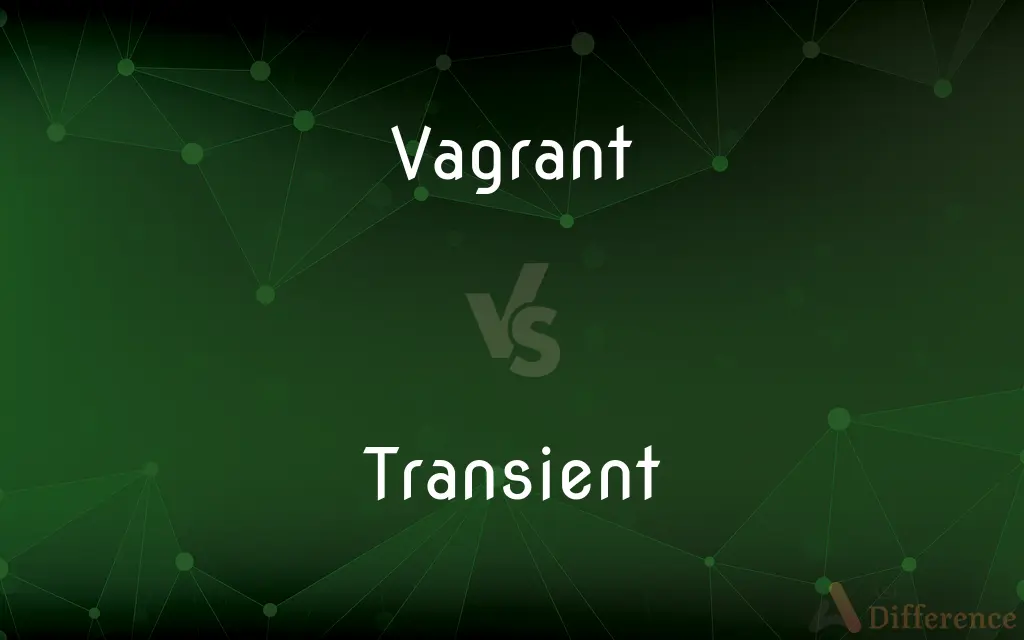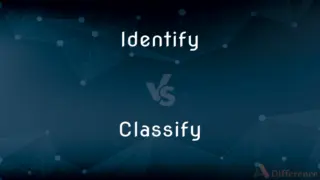Vagrant vs. Transient — What's the Difference?
Edited by Tayyaba Rehman — By Maham Liaqat — Updated on April 16, 2024
Vagrant refers to an individual who wanders from place to place without a permanent home or employment, while transient describes something temporary or staying for a short duration.

Difference Between Vagrant and Transient
Table of Contents
ADVERTISEMENT
Key Differences
A vagrant is typically someone who lives on the streets or travels from one location to another, often without a clear source of income or stable housing. This lifestyle can be due to various socio-economic reasons. On the other hand, transient can refer to any situation, object, or person that is not permanent or lasting only for a short period. It's commonly used to describe temporary conditions or brief stays in a location.
Vagrants are often associated with a nomadic lifestyle, lacking permanent residence by choice or necessity. They might rely on temporary shelters or outdoor environments for living. Whereas, transient individuals or phenomena might be temporarily in a place or state, such as transient workers or transient weather conditions, indicating a short-term engagement with the location or situation.
The legal and social implications for vagrants can be significant, as vagrancy has historically been subject to legal penalties in various regions. This perspective views vagrancy as a public order issue. Conversely, being transient is usually free from legal repercussions unless it involves unlawful behavior, reflecting a more neutral or temporary status.
In public perception, vagrants may be stigmatized as societal outliers who choose or are forced to live outside mainstream social structures. While transients are often seen in a more neutral light, as their status is usually by choice for practical purposes, such as work or travel.
Culturally, the image of a vagrant is sometimes romanticized as a free-spirited traveler but more often viewed negatively. In contrast, transient conditions or lifestyles can be seen as part of modern life’s flexibility, where people adapt to changing circumstances and opportunities.
ADVERTISEMENT
Comparison Chart
Definition
A person who has no fixed home and wanders from place to place.
Something lasting only for a short time or staying temporarily.
Legal Status
Often associated with legal issues or penalties.
Typically no legal implications unless related to specific acts.
Social Perception
Generally seen as outcasts or part of a marginalized community.
Viewed neutrally, associated with temporary phases or choices.
Duration
Lifestyle often adopted long-term.
Brief, temporary engagement or condition.
Example Usage
People living as vagrants due to economic hardship.
Transient workers or transient weather patterns.
Compare with Definitions
Vagrant
Often used pejoratively to describe people perceived as idle or lawless.
The term vagrant was once used to criminalize poverty and homelessness.
Transient
Pertaining to conditions or phenomena that are temporary.
The transient storms left as quickly as they came.
Vagrant
Someone living on the streets or in makeshift conditions.
Vagrants often seek refuge in urban shelters during cold months.
Transient
Lasting only for a short duration; temporary.
The transient nature of his job assignments kept him moving from city to city.
Vagrant
A lifestyle characterized by moving frequently without a permanent residence.
His vagrant lifestyle made it difficult to maintain long-term relationships.
Transient
A person who stays briefly in a place.
The hotel caters primarily to transients who stay a few nights.
Vagrant
A societal label for individuals who do not conform to typical residential or employment norms.
Vagrants have been historically misunderstood and marginalized.
Transient
In medicine, describing symptoms or conditions that appear and vanish quickly.
The patient reported transient pain in the left arm.
Vagrant
A person without a settled home or regular work who wanders from place to place.
The city's social programs aim to assist vagrants with shelter and employment opportunities.
Transient
In physics, describing a temporary state during changes or adjustments.
Transient currents occur when the circuit is switched on or off.
Vagrant
A person without a settled home or regular work who wanders from place to place and lives by begging.
Transient
Lasting only for a short time; impermanent
A transient cold spell
Vagrant
Relating to or living the life of a vagrant
Vagrant beggars
Transient
A person who is staying or working in a place for a short time only.
Vagrant
One who wanders from place to place without a permanent home or a means of livelihood.
Transient
A momentary variation in current, voltage, or frequency.
Vagrant
(Archaic) A wanderer; a rover.
Transient
Passing with time; transitory
"the transient beauty of youth" (Lydia M. Child).
Vagrant
One who lives on the streets or constitutes a public nuisance.
Transient
Remaining in a place only a brief time
Transient laborers.
Vagrant
An animal occurring beyond its normal range; an accidental.
Transient
(Physics) Decaying with time, especially as a simple exponential function of time.
Vagrant
Wandering from place to place and lacking any means of support.
Transient
One that is transient, especially a hotel guest or boarder who stays for only a brief time.
Vagrant
Living on the streets or constituting a public nuisance.
Transient
(Physics) A transient phenomenon or property, especially a transient electric current.
Vagrant
Inconstant or capricious; wayward
"She was resolved to win my vagrant fancy" (Frank Harris).
Transient
Passing or disappearing with time; transitory.
A transient pleasure
Vagrant
Moving in a random fashion; having no fixed direction or pattern
Vagrant ice floes.
A vagrant aroma.
Transient
Remaining for only a brief time.
A transient view of a landscape
A transient disease
Vagrant
Being beyond its normal range; accidental. Used of animals.
Transient
(physics) Decaying with time, especially exponentially.
Vagrant
(dated) A person who wanders from place to place; a nomad, a wanderer.
Transient
Having a positive probability of being left and never being visited again.
Vagrant
(specifically) A person without settled employment or habitation who usually supports himself or herself by begging or some dishonest means; a tramp, a vagabond.
Every morning before work, I see that poor vagrant around the neighbourhood begging for food.
Transient
Occasional; isolated; one-off
Vagrant
Vagrans egista, a widely distributed Asian butterfly of the family Nymphalidae.
Transient
Passing through; passing from one person to another.
Vagrant
An animal, typically a bird, found outside its species' usual range.
Transient
(music) Intermediate.
Vagrant
Wandering from place to place, particularly when without any settled employment or habitation.
A vagrant beggar
Transient
(philosophy) Operating beyond itself; having an external effect.
Vagrant
Of or pertaining to a vagabond or vagrant, or a person fond of wandering.
Transient
Something that is transient.
Vagrant
(figurative) Moving without a certain direction; roving, wandering; also, erratic, unsettled.
Transient
(physics) A transient phenomenon, especially an electric current; a very brief surge.
Vagrant
Moving without certain direction; wandering; erratic; unsettled.
That beauteous Emma vagrant courses took.
While leading this vagrant and miserable life, Johnson fell in love.
Transient
(acoustics) A relatively loud, non-repeating signal in an audio waveform that occurs very quickly, such as the attack of a snare drum.
Vagrant
Wandering from place to place without any settled habitation; as, a vagrant beggar.
Transient
A person who passes through a place for a short time; a traveller; a migrant worker.
Vagrant
One who strolls from place to place; one who has no settled habitation; an idle wanderer; a sturdy beggar; an incorrigible rogue; a vagabond.
Vagrants and outlaws shall offend thy view.
Transient
A homeless person.
Vagrant
A wanderer who has no established residence or visible means of support
Transient
A module that generally remains in memory only for a short time.
Vagrant
Continually changing especially as from one abode or occupation to another;
A drifting double-dealer
The floating population
Vagrant hippies of the sixties
Transient
(Philippines) homestay
Transient
Passing before the sight or perception, or, as it were, moving over or across a space or scene viewed, and then disappearing; hence, of short duration; not permanent; not lasting or durable; not stationary; passing; fleeting; brief; transitory; as, transient pleasure.
Transient
Hasty; momentary; imperfect; brief; as, a transient view of a landscape.
Transient
Staying for a short time; not regular or permanent; as, a transient guest; transient boarders.
What is loose love? A transient gust.
If [we love] transitory things, which soon decay,Age must be loveliest at the latest day.
O fleeting joysOf Paradise, dear bought with lasting woes.
Transient
That which remains but for a brief time.
Transient
One who stays for only a short time;
Transient laborers
Transient
(physics) a short-lived oscillation in a system caused by a sudden change of voltage or current or load
Transient
Of a mental act; causing effects outside the mind
Transient
Enduring a very short time;
The ephemeral joys of childhood
A passing fancy
Youth's transient beauty
Love is transitory but at is eternal
Fugacious blossoms
Common Curiosities
Is vagrancy still illegal?
In some places, vagrancy laws still exist, though they are often contested and vary widely.
How are transients viewed in society?
Transients are usually seen neutrally, associated with modern lifestyles involving travel or temporary jobs.
What is the main difference between a vagrant and a transient?
A vagrant is someone without a permanent home who moves frequently, whereas a transient refers to conditions or persons existing temporarily.
Are transients always people?
No, transient can also describe temporary states, events, or conditions.
What are common reasons for transient lifestyles?
Reasons include employment, travel, education, or personal circumstances like renting temporarily.
What makes transient conditions challenging?
The uncertainty and lack of permanence can be stressful and disruptive.
Can "vagrant" have a positive connotation?
While traditionally negative, some view the vagrant lifestyle as embodying freedom and non-conformity.
Why might someone prefer a transient lifestyle?
Preferences for flexibility, adventure, or the necessity of temporary assignments might influence this choice.
How do social services approach vagrants?
Social services often aim to provide housing, healthcare, and employment support to integrate vagrants into society.
What types of support systems are available for transients?
Transients might access temporary housing, job placement services, and other resources tailored to short-term needs.
Can vagrancy be a lifestyle choice?
Yes, some choose a nomadic lifestyle, valuing freedom and flexibility over stability.
What impact does vagrancy have on public perception?
Vagrancy can challenge societal norms, sometimes resulting in negative stereotypes or empathy and support initiatives.
Do vagrants choose their lifestyle?
It can be by choice or necessity, often influenced by socioeconomic factors.
How does the legal definition of vagrancy affect those labeled as such?
Legal definitions can lead to penalties, social stigma, and limited access to resources.
How do communities typically react to vagrants?
Reactions can vary from supportive to hostile, often influenced by local attitudes and laws.
Share Your Discovery

Previous Comparison
Count vs. Lord
Next Comparison
Identify vs. ClassifyAuthor Spotlight
Written by
Maham LiaqatEdited by
Tayyaba RehmanTayyaba Rehman is a distinguished writer, currently serving as a primary contributor to askdifference.com. As a researcher in semantics and etymology, Tayyaba's passion for the complexity of languages and their distinctions has found a perfect home on the platform. Tayyaba delves into the intricacies of language, distinguishing between commonly confused words and phrases, thereby providing clarity for readers worldwide.















































